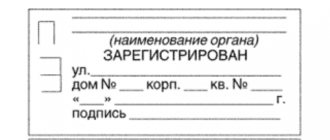- What is a place of residence?
- Place of residence of children and incapacitated citizens
- Registration at place of residence
- List of documents required for registration at the place of residence
- The practical significance of residence
- Place of stay
- List of documents required for registration at the place of stay
- For how long can a citizen be registered at the place of residence?
- Removal of Russian citizens from registration at the place of stay and place of residence
- useful links
What is place of residence
Every capable citizen of the Russian Federation chooses his place of residence at his own discretion. Free choice of place of residence is one of the most important human rights provided for by international agreements and Article 27 of the Constitution of the Russian Federation. Article 150 of the Civil Code of the Russian Federation (hereinafter referred to as the Civil Code) establishes that the right to choose a place of residence as an intangible benefit belonging to a citizen is protected by law.
In Russian legal acts, place of residence is understood as:
- the place where the citizen permanently or primarily resides (clause 1 of Article 20 of the Civil Code of the Russian Federation);
- residential building, apartment, service residential premises, specialized house, as well as other residential premises in which a citizen permanently or primarily resides as the owner, under a tenancy agreement, lease agreement or on other grounds provided for by the legislation of the Russian Federation (Article 2 of the Law of the Russian Federation dated 25 June 1993 No. 5242-1 “On the right of citizens of the Russian Federation to freedom of movement, choice of place of stay and residence within the Russian Federation” (hereinafter referred to as the Law of the Russian Federation of June 25, 1993 No. 5242-1);
- is a residential building, apartment, room, residential premises of a specialized housing stock (service residential premises, residential premises in a dormitory, residential premises of a mobile fund, residential premises in a building of a social service system, etc.) or other residential premises in which a citizen is permanently or primarily lives as an owner, under a lease (sublease), a lease agreement for specialized residential premises, or on other grounds provided for by the legislation of the Russian Federation, and in which he is registered at the place of residence (paragraph 2 of clause 3 of the Rules for registration and deregistration of citizens of the Russian Federation at the place of stay and place of residence within the Russian Federation, approved by Decree of the Government of the Russian Federation of July 17, 1995 No. 713, hereinafter referred to as the Registration Rules).
Thus, when characterizing the concept of “place of residence,” the legislator identifies three elements, according to which the location of a citizen can be recognized as a place of residence:
- status of the premises (residential building, apartment, service residential premises, specialized house (dormitory, hotel-shelter, house of flexible fund, special home for single elderly people, boarding house for the disabled), as well as other residential premises);
- period of residence: permanently or predominantly (temporarily);
- grounds for residence (for example, as an owner, under a lease (sublease), lease, etc.).
However, permanent residence does not mean long-term residence as one of the mandatory conditions. It is important that, due to the prevailing conditions, the citizen settles in a given place.
For some categories of citizens, a legal place of residence, i.e. determined by the law itself, is provided:
- Place of residence of minors under 14 years of age, the place of residence of their parents, adoptive parents or guardians is recognized (clause 2 of article 20 of the Civil Code).
If parents or adoptive parents live in different places, the place of residence of their children under the age of 14 will be the place of residence of the parent (adoptive parents) with whom the children live.
- The place of residence of incapacitated citizens under guardianship is considered to be the place of residence of their guardians.
Place of Temporary Stay This is
Place of residence is a residential premises in which a citizen permanently or primarily resides and in which he is registered at his place of residence. This is a separate type of registration, which is sometimes called “propiska” for simplicity, although there is no such term in the laws. The registration mark at the place of residence is in the passport.
You may be interested in:: How to Activate a Preferential Transport Card CityCard for the First Time Forums
Place of stay is the place where a citizen lives temporarily. For example, a hotel, holiday home, student dormitory or rented apartment in another region. They are registered temporarily at the place of stay, and temporary registration does not replace or cancel permanent registration. You can have a place of residence, that is, permanent registration, in one locality, and temporary registration at the place of stay in another. Registration at the place of residence is confirmed by a certificate.
Registration at place of residence
The mere fact of permanent or primary residence of a citizen legally in a certain place does not provide grounds for determining his place of residence. Currently, the main factor that makes it possible to establish a citizen’s place of residence for the purpose of registration is a formal sign - registration of a citizen at the place of residence , carried out in accordance with the Registration Rules. Documents confirming the address of residence of a citizen of the Russian Federation are documents certifying the identity of an individual (passport or other document).
Typically, law enforcement officers proceed from the assumption that a citizen is registered at the place of his actual residence. Registration is a method of registering citizens within the Russian Federation provided for by law, which is of a notification nature and reflects the fact that the citizen is at the place of stay or residence.
Thus, the main proof of a citizen’s place of residence is his registration. However, the lack of registration does not exclude the possibility of establishing a citizen’s place of residence on the basis of other data that does not necessarily come from the registration authorities.
The registration rules provide for the obligation of citizens to register at their place of stay and place of residence with the registration authorities.
Registration of citizens of the Russian Federation at their place of residence is carried out by putting the appropriate mark in their passports (clause 18 of the Registration Rules). Citizens of the Russian Federation whose registration at the place of residence is carried out using other identification documents are issued a certificate of registration at the place of residence. Such documents, according to clause 5 of the Registration Rules, include a birth certificate (for persons under 14 years of age) and a passport identifying a citizen of the Russian Federation outside the Russian Federation (for persons permanently residing outside the Russian Federation).
List of documents required for registration at the place of residence
According to paragraph 18 of the Registration Rules, for registration at the place of residence, a citizen submits to the persons responsible for registration:
- identification document;
- application for registration at the place of residence in the prescribed form;
- a document that is the basis for moving into a residential premises (application of the person(s) who provided the citizen with residential premises, an agreement, a certificate of state registration of rights (ownership rights to residential premises), a court decision recognizing the right to use residential premises or another document or its proper a certified copy confirming the existence of the right to use the residential premises). To register, it is enough to submit one of the listed documents.
Citizens who were deregistered at their place of residence before arriving at a new place of residence shall submit a departure address sheet issued by the authorized body at their previous place of residence.
In case of absence (loss) of the departure address sheet, the citizen reports in writing the reasons why he cannot provide it. The absence of a departure address sheet for a citizen who has been deregistered at his last place of residence is not grounds for refusal to accept and consider his application for registration at his place of residence.
Registration deadlines
Citizens who arrive for temporary residence in residential premises that are not their place of residence for a period of more than 90 days are required to register at such place of stay upon expiration of the specified period (clause 9 of the Registration Rules).
A citizen who has changed his place of residence is obliged not to register at his new place of residence no later than 7 days from the date of arrival at his new place of residence.
How long can you live without registration?
Some government services and the implementation of citizens’ rights are “tied” to registration. For example, if a child is not registered, he will go to kindergarten and school on a residual basis - if there are places. Priority will be given to those children who are registered in the territory of a specific municipality.
You may be interested in:: Liquidator Chaes Ticket to the Sanatorium
In order to vote in an election, a citizen must be registered in the territory of any polling station. It is not necessary to vote there - you can physically put your ballot in the ballot box in another place. But to do this, you need to pick up an absentee ballot at the polling station at your place of registration. It will be impossible to do this without registration.
According to paragraph 2 of Art. 36 of the Civil Code of the Russian Federation, guardians and trustees of minors are required to live together with their wards. Separation is possible if the ward has reached 16 years of age. Based on this, the place of residence of a minor under 16 years of age, to whom the guardianship authority has appointed a guardian (orphans), determines the place of his guardian. And if they live separately, it is determined on a general basis. The law follows the path that the municipality where the orphan lives must provide housing for orphans.
Legislation uses the term “place of residence” very often. This includes receiving some government and social services. For example, entering school (as a general rule). And going to court often occurs at the defendant’s place of residence. The issue of registration at the place of residence is closely related to the right to move into housing. Or eviction from a residential premises. We will tell you what a citizen’s place of residence is in this publication.
- by registration your address: Moscow, Sukharevsky Lane, 8-13;
- you went to visit relatives, stayed for more than 90 days, so you had to register at your place of stay: Ivanovo, Smirnova, 46-3;
- but in reality you live with your relatives in a cottage in the suburbs of the Ivanovo region, in the village of Afanasovo.
In the second case, the registration is also not canceled, and the address of actual residence may coincide with it, or may differ. But if, when staying in another city, in reality you may not live at the temporary registration address, then you must live in the second city, because we are talking about the actual (valid) place of residence.
The practical significance of residence
An accurate determination of the place of residence is essential for protecting the rights and interests of citizens and ensuring state interests.
The need to know the exact place of residence of a citizen arises when resolving a number of legal issues and the fulfillment by citizens of their rights and obligations, including civil, family, administrative and procedural. The lack of registration at the place of residence prevents the implementation of a number of fundamental rights and freedoms of citizens recognized and guaranteed by the Constitution of the Russian Federation, in particular the rights:
- to freely use their abilities and property for entrepreneurial and other economic activities not prohibited by law;
- freely and fully use and dispose of property, freely move goods, services and financial resources;
- for social security, medical care, preschool and school education;
- determining the place of residence of minors under 14 years of age and citizens under guardianship;
- civil registration;
- registering those in need of improved housing conditions and providing housing in state and municipal housing funds;
- be registered as a taxpayer - an individual;
- appeals to judicial authorities and participation in civil proceedings, as well as in enforcement proceedings;
- to receive official calls, notifications, notices, including subpoenas;
- to accept the inheritance, because The place of opening of the inheritance is the last permanent place of residence of the testator.
Place of stay
The place of residence is the place where a citizen temporarily resides - a hotel, sanatorium, holiday home, boarding house, camping, hospital, tourist center, other similar institution, as well as residential premises that are not the citizen’s place of residence
Place of residence is the place where you live temporarily; you must register at your place of residence 90 days from the date of arrival (clause 9 of the Registration Rules).
Registration of citizens at their place of stay is carried out without deregistration at their place of residence.
In this case, a citizen has the right to register at the place of residence even before the expiration of the 90-day period.
List of documents required for registration at the place of stay
According to paragraph 9 of the Registration Rules, for the registration of citizens at the place of residence, the citizen submits to the persons responsible for registration:
- identification document;
- application in the established form for registration at the place of residence;
- a document that is the basis for the temporary residence of a citizen in the specified residential premises (lease (sublease) agreements, social tenancy of residential premises, a certificate of state registration of the right to residential premises or an application from the person providing the citizen with residential premises).
In the case of registration at the place of residence on the basis of a social tenancy agreement for residential premises concluded in accordance with the housing legislation of the Russian Federation, or a certificate of state registration of the right to residential premises, a citizen has the right not to present these documents, but only indicate in the application for registration at the place of residence their requisites.
In this case, the registration authority independently requests information from state bodies and local government bodies about such documents and registers the citizen at the place of residence.
Territorial bodies of the Federal Migration Service register citizens at the place of stay in residential premises that are not their place of residence in the prescribed manner and issue them a certificate of registration at the place of stay.
At the request of the citizen, a certificate of registration at the place of residence can be sent by the registration authority by mail to the address of the residential premises specified in the application for registration at the place of residence.
For how long can a citizen be registered at the place of residence?
The period for registration of a citizen at the place of residence is determined by mutual agreement:
- with tenants and all adult citizens living together with them, subject to living in houses of state, municipal and specialized housing funds;
- with owners of residential premises;
- with the boards of housing or housing-construction cooperatives, if the members of the cooperatives are not the owners of these residential premises.
The signature in the requisite “signature of the person who provided the residential premises” of the application for registration at the place of residence in Form N 1 or the application for registration at the place of residence in Form N 6 is confirmation of the existence of an agreement between the tenant or the owner of the residential premises with the citizen for his occupancy and temporary (permanent) ) accommodation.
Adult users living together with the tenant of the residential premises express their consent to the move-in and temporary (permanent) residence of a citizen in writing.
Removal of Russian citizens from registration at the place of stay and place of residence
Citizens are considered deregistered at the place of stay upon expiration of the deadlines specified in their applications for registration at the place of stay (clause 30 of the Registration Rules), and in hotels, sanatoriums, rest homes, boarding houses, campsites, hospitals, tourist centers and other similar institutions - upon their retirement.
In case of early departure of a citizen from a residential premises that is not his place of residence, this citizen or the person who provided him with residential premises for temporary residence submits an application in any form to remove him from the registration register at the place of residence, indicating the date of departure (if such a date known) or sends the application by mail or through the Unified Portal to the registration authority that carried out the registration at the place of residence of this citizen.
The owner (tenant) of a residential premises, in the event of receiving a notification of registration at the place of residence of a citizen to whom he did not give consent for temporary residence, may submit an application in any form to cancel this citizen's registration at the place of stay to the registration authority that carried out the registration at the place stay of this citizen.
Removal of a citizen from registration at the place of residence is carried out by registration authorities in the following cases:
- change of place of residence - on the basis of a citizen’s application in writing or in the form of an electronic document about registration at a new place of residence or about deregistration at the place of residence.
- conscription for military service - based on a message from the military commissariat;
- conviction to imprisonment - on the basis of a court verdict that has entered into legal force;
- recognition as missing - on the basis of a court decision that has entered into legal force;
- death or declaration of death by a court decision - on the basis of a death certificate issued in the manner prescribed by law;
- eviction from an occupied residential premises or recognition as having lost the right to use residential premises - on the basis of a court decision that has entered into legal force;
- detection of untrue information or documents that served as the basis for registration, as well as unlawful actions of officials when deciding the issue of registration - on the basis of a court decision that has entered into legal force.
What procedure is established by law for deregistering citizens of the Russian Federation at their place of stay and place of residence?
Citizens are considered deregistered at the place of stay upon expiration of the deadlines specified in their applications for registration at the place of stay, and in hotels, sanatoriums, rest homes, boarding houses, campsites, medical organizations, tourist centers and other similar institutions - according to their disposal (clause 30 of the Registration Rules).
In case of early departure of a citizen from a residential premises that is not his place of residence, this citizen or the person who provided him with residential premises for temporary residence submits an application in any form to remove him from the registration register at the place of residence, indicating the date of departure (if such a date known) or sends the application by mail or through the Unified Portal to the registration authority that carried out the registration at the place of residence of this citizen.
The owner (tenant) of a residential premises, in the event of receiving a notification of registration at the place of residence of a citizen to whom he did not give consent for temporary residence, may submit an application in any form to cancel this citizen's registration at the place of stay to the registration authority that carried out the registration at the place stay of this citizen.
Removal of a citizen from registration at the place of residence is carried out by registration authorities in the following cases:
a) change of place of residence - on the basis of a citizen’s application in writing or in the form of an electronic document about registration at a new place of residence or about deregistration at the place of residence;
b) recognition as missing - on the basis of a court decision that has entered into legal force;
c) death or declaration of death by a court decision - on the basis of a death certificate issued in the manner prescribed by law;
d) eviction from an occupied residential premises or recognition as having lost the right to use residential premises - on the basis of a court decision that has entered into legal force;
e) detection of untrue information or documents that served as the basis for registration, as well as unlawful actions of officials when deciding the issue of registration - on the basis of a court decision that has entered into legal force;
f) identification of the fact of fictitious registration of a citizen of the Russian Federation at the place of residence - on the basis of a decision of the territorial body of the Federal Migration Service;
g) receipt of an application from a citizen located outside the Russian Federation, certified by the relevant Russian foreign institution in the country of residence, or by a notary with subsequent legalization of the document in accordance with the Hague Convention of 1961, except for cases where an apostille is not required in accordance with the international treaty of the Russian Federation Federation (arrived by post from the country of residence);
When citizens are deregistered at their place of residence on the grounds provided for in subparagraphs “b”, “c”, “d” and “e”, the relevant documents can be submitted by interested individuals and legal entities.
On the procedure for submitting an application for registration at the place of residence by mail
When sending an application for registration at the place of residence by mail to the registration authority in Form No. 1PR, signed by the applicant and the owner (tenant) of the residential premises, the citizen simultaneously sends a copy of the identity document and the document that is the basis for the citizen’s temporary residence in the specified residential premises premises, certified by a notary or an official responsible for registration.
Simultaneously with the specified documents, an address sheet of arrival is sent in form No. 2 and a statistical sheet of arrival in form No. 12P (to be filled out when registering for a period of 9 months and above).
If the citizen expresses his will, a completed certificate of registration at the place of stay is issued to him on reception days directly at the unit, or is sent by the registration authority by mail to the residential address indicated by the citizen in the application for registration at the place of stay.
The owner (tenant) is sent a written notification of the completed registration at the place of stay of the citizen in his residential premises.
Where and within what time period must one apply for registration at the place of stay or place of residence?
To register at your place of stay or place of residence in a specific residential area, you must submit an appropriate application and the necessary documents to the persons responsible for receiving and transferring documents to the territorial bodies of the Federal Migration Service.
The persons responsible for transferring documents to the territorial bodies of the Federal Migration Service, depending on the form of ownership of the residential premises, are:
- owners of residential premises who independently manage their residential premises (i.e. there is no agreement on the conduct of this work between them, on the one hand, and the organization managing the housing stock, on the other hand),
- authorized persons of the homeowners association or housing management organization (if there is an agreement for them to carry out this work);
- authorized persons of the management bodies of housing and housing-construction cooperatives (if the residential premises are located in the houses of housing and housing-construction cooperatives);
- authorized officials of multifunctional centers for the provision of state (municipal) services;
- officials of state authorities of the Russian Federation or state authorities of constituent entities of the Russian Federation in the field of housing relations, exercising control over compliance with the rules for the use of state residential premises (i.e. the residential premises are in state ownership) and municipal (i.e. the residential premises are in municipal ownership) housing stock.
To register at the place of residence of a citizen of the Russian Federation in residential premises belonging to him by right of ownership, it is necessary to contact the authorized persons of the homeowners' association or the organization managing the housing stock. In their absence (i.e. in the absence of an agreement to conduct this work between the owner of the residential premises on the one hand and the organization managing the housing stock on the other hand), regarding registration at the place of residence, you must contact directly the division of the Federal Migration Service that serves the territory, on which the corresponding residential premises are located.
Citizens also have the right to send applications for registration at their place of stay or place of residence to the territorial body of the Federal Migration Service of Russia serving the territory on which the corresponding residential premises are located, in the form of an electronic document through the Unified Portal for the provision of state and municipal services or by mail (only for registration by place of stay).
An application for registration at a place of residence must be submitted by a citizen no later than 7 days from the date of arrival at a new place of residence.
An application for registration at the place of residence is submitted by citizens who arrived for temporary residence in residential premises that are not their place of residence for a period of more than 90 days, before the expiration of the specified period.
The article was written and posted on November 7, 2012. Added - 08/29/2014, 05/24/2017
ATTENTION!
Copying the article without providing a direct link is prohibited. Changes to the article are possible only with the permission of the author.
Author: lawyer and tax consultant Alexander Shmelev © 2001 — 2020
Differences between place of stay and actual residence in 2021
- The place where the citizen lives most of the time or permanently;
- Residential premises (apartment, house, office premises, etc.), of which he is the owner, either rents it, or is located in it for other reasons;
- The place to which the citizen is registered in accordance with the Registration Rules.
- The citizen notified the registration authorities of his relocation and registration in a new place in writing;
- The citizen was called up for military service;
- The citizen was convicted and imprisoned;
- The citizen is declared missing by a court decision;
- By court decision, the citizen was declared dead;
- The citizen was evicted due to the loss of the right to reside in accordance with a court decision;
- When registering, the citizen provided deliberately false information.
26 Apr 2021 lawbellex 155
Share this post
- Related Posts
- Large Families in the Krasnodar Territory - How Many Children?
- How to Get Payments from Flood Insurance
- Can Bailiffs Describe the Debtor’s Property Where It Has No Relation to the Property and is Not Registered
- Do Bailiffs Have the Right to Search My Bag?
Useful links on the topic “Place of residence and place of stay”
- Rules for registration at place of residence and stay
- Moscow passport offices (addresses, phone numbers, opening hours)
- Passport offices of St. Petersburg (addresses, telephone numbers, opening hours)
- Government services via the Internet
- Legal advice on real estate
- Inheritance by law
- Child benefits
- Maternal capital
- Compulsory medical insurance policy
- What is SNILS and why is it needed?
- Identity documents
- TIN
- Child's rights
- Social Security
- Reference and legal information on:
- Russian Federation
- Moscow and Moscow region
- St. Petersburg and Leningrad region
- Nizhny Novgorod region







